You are here
New Releases
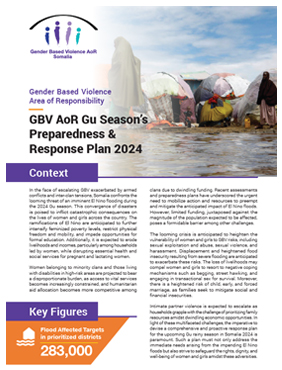
GBV AoR Gu Season’s Preparedness & Response Plan 2024
Somalia faces a dire situation with escalating gender-based violence (GBV) exacerbated by armed conflicts and inter-clan tensions, compounded by the imminent threat of El Niño flooding during the 2024 Gu season. The convergence of these disasters threatens catastrophic consequences, particularly for women and girls, intensifying feminized poverty, restricting mobility, and hindering formal education opportunities. Livelihoods, particularly in female-headed households, will suffer, and essential health and social services for pregnant and lactating women will be disrupted. Minority clan women and those with disabilities in high-risk areas will bear a disproportionate burden, as access to vital services diminishes amid dwindling humanitarian funding. The looming crisis heightens risks of GBV, including sexual exploitation, violence, and harassment, exacerbated by displacement and food insecurity. Negative coping mechanisms such as begging and transactional sex may increase, alongside risks of child marriage. Intimate partner violence may escalate as families struggle to prioritize resources. Urgent action and comprehensive response plans are imperative to safeguard the rights and well-being of women and girls amidst these adversities during the upcoming Gu rainy season in Somalia 2024.
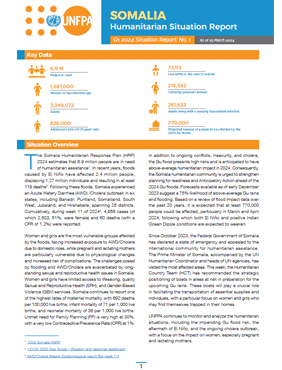
Somalia Humanitarian Situation Report: January-March 2024
The Somalia Humanitarian Response Plan (HRP) 2024 highlights the dire situation with 6.9 million people requiring aid, exacerbated by recent floods from El Niño affecting 2.4 million and leading to an Acute Watery Diarrhea (AWD)/Cholera outbreak. Women and girls are disproportionately affected due to their domestic roles and limited access to Sexual and Reproductive Health (SRH) and Gender-Based Violence (GBV) services, contributing to high maternal and infant mortality rates. Anticipating the upcoming Gu floods, forecasted to have above-average impact, the Somalia humanitarian community is urged to strengthen readiness and Anticipatory Action. The government has declared a state of emergency, seeking international assistance, and initiatives like positioning boats are underway to aid transportation of essential supplies, particularly prioritizing the safety of women and girls. UNFPA remains vigilant in monitoring these crises' impact, particularly on vulnerable groups like pregnant and lactating mothers.
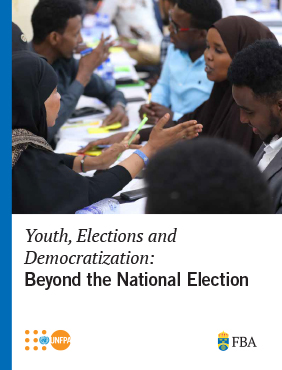
Youth, Elections and Democratization: Beyond the National Election
Enhancing youth political participation in Somalia necessitates a multifaceted approach rooted in inclusivity and empowerment. This report serves as a testament to the invaluable insights gleaned from Somali youth and various stakeholders, as deliberated upon in forums dedicated to youth, elections, and democratization across all member states of Somalia. Central to these discussions is the recognition that meaningful engagement of young people is pivotal for the country's democratic advancement and sustainable peace.
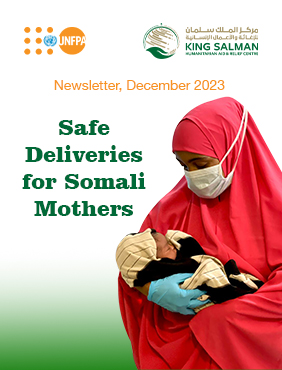
Safe Deliveries for Somali Mothers
“Safe Birth in the Shadow of Complex Humanitarian Crises,” supported by KSRelief and implemented by the UNFPA Somalia Country Office, primarily focuses on reducing maternal and neonatal mortality and morbidity among IDPs and host communities in Somalia. There is a specific emphasis on improving maternal and reproductive health services for women and girls impacted by displacement and humanitarian crises in Somalia.
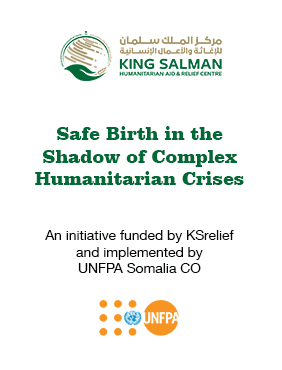
Safe Birth in the Shadow of Complex Humanitarian Crises
The initiative “Safe Birth in the Shadow of Complex Humanitarian Crises” is a project funded by KSRelief and executed by UNFPA Somalia Country Office. It primarily focuses on reducing maternal and neonatal mortality and morbidity among IDPs and host communities in Somalia, with a specific emphasis on improving maternal and reproductive health services for women and girls impacted by displacement and humanitarian crises in Somalia.
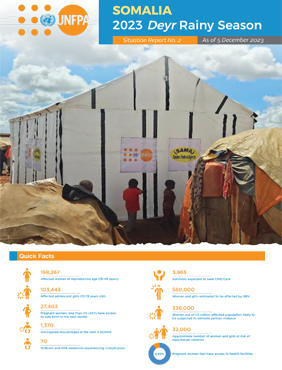
Somalia: 2023 Deyr Rainy Season Situation Report #2
Somalia's humanitarian crisis has intensified due to severe flooding induced by El Niño. Heavy rains and flooding now affect a broader expanse of Somalia, encompassing 33 out of 74 districts, a significant increase from 21 districts reported two weeks ago. The toll has been grave, with approximately 100,000 lives lost, including women and children, as of the latest update on November 17, 2023. The newly affected districts predominantly lie in the South-West, Hirshabelle, Jubaland states, and the Banadir Region
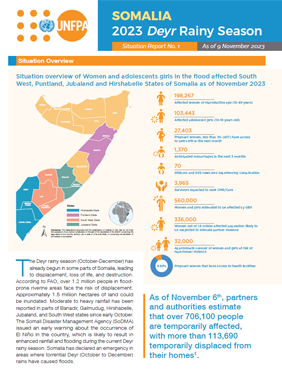
Somalia: 2023 Deyr Rainy Season Situation Report #1
The Deyr rainy season in Somalia, spanning from October to December, has triggered significant challenges, including displacement, loss of life, and infrastructure damage. The FAO warns that over 1.2 million people in flood-prone areas are at risk of displacement, with 1.5 million hectares of land potentially inundated. The onset of El Niño is expected to exacerbate rainfall and flooding. Flash floods have damaged critical infrastructure, leading to potential water- and vector-borne diseases. The disruption of aid delivery is hampered by impassable muddy grounds. Women and girls are disproportionately affected, with a high risk of gender-based violence. The 2023 Somalia Humanitarian Needs Overview reveals that 8.25 million people require assistance, with specific concerns for women and girls of reproductive age. Displacement increases vulnerability, impacting access to essential services and escalating risks, including economic hardships and gender-based violence. The flooding is anticipated to cause a surge in miscarriages, stillbirths, and pregnancy complications, emphasizing the urgent need for continued access to reproductive health services amid the escalating crisis.
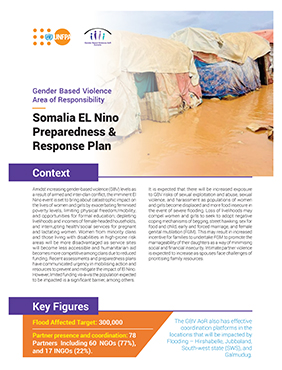
GBV AoR Somalia EL Nino Preparedness & Response Plan
Amidst escalating gender-based violence (GBV) linked to armed conflicts and inter-clan strife, the impending El Nino event threatens to have devastating consequences on the lives of women and girls. It is poised to worsen feminized poverty, restrict physical freedom and educational opportunities, deplete female-headed households' incomes, and disrupt essential health and social services for pregnant and lactating women. Vulnerable populations, such as women from minority clans and those with disabilities in high-risk areas, will face heightened disadvantages as service accessibility declines, and humanitarian aid becomes scarcer due to reduced funding. In response to these challenges, urgent action and resource mobilization are required, but limited funding poses a significant obstacle. The increased risk of GBV, sexual exploitation, and harassment is anticipated as displaced women and girls become more food insecure during severe flooding, potentially leading to negative coping mechanisms and an upsurge in intimate partner violence. The GBV AoR also has effective coordination platforms in the locations that will be impacted by Flooding – Hirshabelle, Jubbaland, South-west state (SWS), and Galmudug.
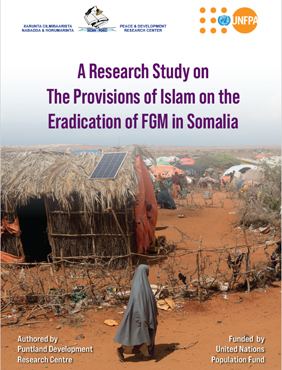
A Research Study on The Provisions of Islam on the Eradication of FGM in Somalia
A UNFPA-commissioned study by PDRC examined FGM's historical precedence and resistance from the Ulama (Somali religious scholars). It used literature reviews, interviews, and focus groups in various cities. The study found that FGM lacks support in the Quran, Hadith, Ijma’a, or qiyas. Ulama interpretations vary, with some considering Type I FGM as recommended, while Type III is seen as prohibited. Some argue FGM is virtuous, but the Ulama recommend consulting medical practitioners before ruling on FGM. They emphasize that the Prophet (PBUH) never practiced it, concluding that FGM is not permissible in Islam, aligning with the authentic Hadith: "Do not harm yourself or others."
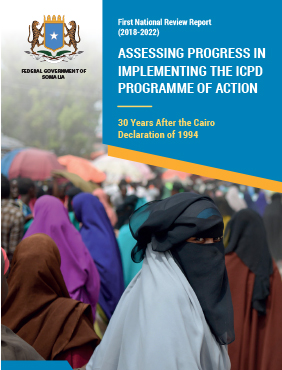
Assessing Progress in Implementing the ICPD Programme of Action: First National Review Report
The ICPD Progress Review Report for Somalia, the first of its kind, provides an overview of the country's progress in implementing the commitments made at the 1994 International Conference on Population and Development (ICPD) for the period 2018-2022. The report assesses the achievements, challenges, and gaps in fulfilling the goals of the ICPD Programme of Action (PoA), particularly in the areas of sexual and reproductive health and rights (SRHR), gender equality, and empowerment of women and girls as well as international cooperation and partnerships.